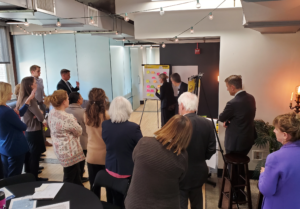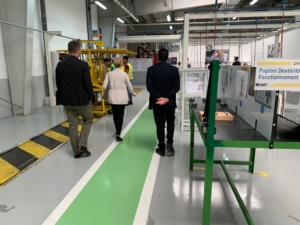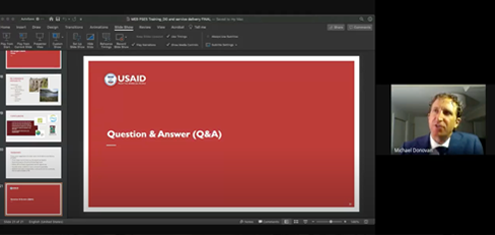 During the COVID-19 pandemic, Integra is continuing to provide modified support for the USAID/Middle East Bureau under the USAID Learning, Evaluation and Analysis Project (LEAP III). Integra’s support includes assisting the Middle East Bureau and Missions in the MENA region with implementing the Agency’s 2018 Private Sector Engagement (PSE) Policy. With the emergence of COVID-19 stay-at-home orders, travel restrictions, and an overall concern for the health and safety of all involved, Integra adapted activity operations to ensure continuity through an entirely remote environment.
During the COVID-19 pandemic, Integra is continuing to provide modified support for the USAID/Middle East Bureau under the USAID Learning, Evaluation and Analysis Project (LEAP III). Integra’s support includes assisting the Middle East Bureau and Missions in the MENA region with implementing the Agency’s 2018 Private Sector Engagement (PSE) Policy. With the emergence of COVID-19 stay-at-home orders, travel restrictions, and an overall concern for the health and safety of all involved, Integra adapted activity operations to ensure continuity through an entirely remote environment.
Opportunity
A monthly training series designed to build PSE awareness and skills for Bureau and Mission staff is a critical component of the engagement. Beginning in March, these trainings were shifted to remote delivery and participation, requiring Integra to re-think how to present the information, while continuing to meet the training objectives.
Remote delivery poses a host of new challenges beyond those typically associated with trainings and workshops. Training material needs to be accessible for participants dialing in through their phone or joining via a link on their computer, as well as shareable afterwards for those unable to attend the live session. Presentations need to be adapted to engage the audience, while accommodating limited bandwidth and possible connectivity issues. Speaker remarks must be well rehearsed to ensure smooth delivery and scripted to prevent presenters from speaking over one another. Attendees must also be able to both participate in Q&A periods and breakout into small group work sessions to allow for effective communication between team members, many of whom are located in different parts of the world. Furthermore, some participants were temporarily relocated, requiring that new time zones be considered during scheduling. New technology tools needed to be deployed and tested for the meeting coordinators, presenters, and participants. None of these challenges were envisioned in the original workplan. COVID-19 provided an opportunity for Integra to adapt and we did so with the support of USAID.
Impact
Integra found innovative methods and approaches to continue delivering for the USAID/Middle East Bureau and is preparing to deliver the fifth remote training since the COVID-19 outbreak. In fact, training attendance has significantly increased (more than 200%) since switching to remote delivery, reaching over 100 unique participants, with an average of 50 participants per training, in March, April, and May. The remote delivery trainings have provided opportunities for knowledge sharing and learning necessary for effectively partnering with the private sector to improve development impact. Recent training topics have included tips and tools for identifying and reaching out to the private sector; an introduction to the Development Finance Corporation (DFC); partnering with the private sector for improved service delivery; and applying the Agency’s new 2020-2024 Digital Strategy in line with PSE Policy for better outcomes in the MENA region.
Beyond the PSE training series, Integra is also working to adapt other activity operations to a remote environment. For example, another component to the MENA support is conducting private sector outreach. In this effort, LEAP III connects with private sector actors, identifies potential opportunities for partnership, and makes introductions to Bureau or Mission staff. Portfolio reviews began in February 2020 for Missions in the region, using a PSE lens, to determine current and upcoming mechanisms that present openings for private sector engagement. These portfolio reviews were conducted in an entirely remote environment using video teleconferences and modified desk research. Despite the virtual challenges, these efforts produced clear and succinct write ups of Mission activities that the LEAP III team and Bureau staff could reference during meetings with private sector prospects.
Domestic travel to Silicon Valley and New York City was planned for April 2020, following the completion of the portfolio reviews. Acknowledging that companies would deprioritize direct conversations regarding longer-term investment plans in order to focus bandwidth on the COVID-19 response, LEAP III suspended the in-person outreach, so as not to waste social capital by pushing conversations that are not a priority. Integra is now adapting the original approach, conducting virtual outreach where possible and adjusting the pitch to prioritize shorter-term private sector objectives, such as those related to COVID-19, over longer-term growth strategies.
Finding new ways to deliver training, enhance capacity, and gather information has been an active part of Integra’s response to the challenges of COVID-19. That effort has been supported by technology and adapted approaches which are being embraced by USAID. Our current challenge is to build critical private sector relationships remotely as a necessary response to the reality that many firms are not scheduled to return to the office full time in 2020.
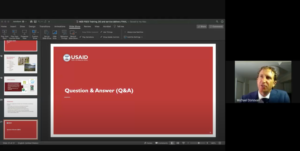
USAID/Middle East Bureau PSE training, May 2020

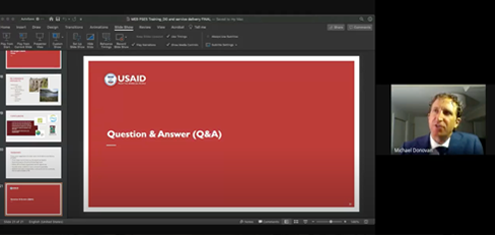
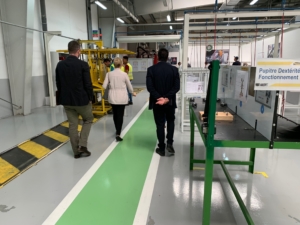
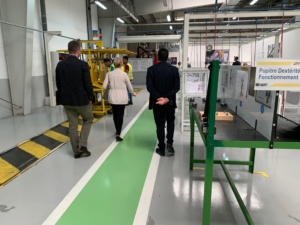 USAID issued its first Private Sector Engagement (PSE) Policy in December 2018, codifying nearly two decades of formal collaboration with private sector actors, as well as earlier Agency initiatives which recognized the private sector’s role in development. The PSE Policy, described as “a call to action” in the document itself, recognized the private sector’s fundamental role in ending the need for foreign assistance, and aims to inspire and equip USAID staff to work hand-in-hand with private sector actors.
USAID issued its first Private Sector Engagement (PSE) Policy in December 2018, codifying nearly two decades of formal collaboration with private sector actors, as well as earlier Agency initiatives which recognized the private sector’s role in development. The PSE Policy, described as “a call to action” in the document itself, recognized the private sector’s fundamental role in ending the need for foreign assistance, and aims to inspire and equip USAID staff to work hand-in-hand with private sector actors.